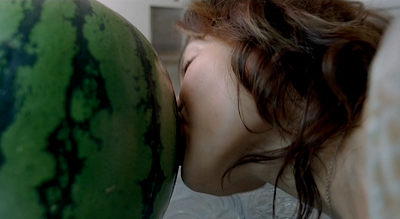One of them was Tsai Ming-liang's The Wayward Cloud (2004), which I had never seen until Friday morning. In some ways, I am still wrestling with my response to this film, a fascinating sort of quasi-porno-musical set in an alternate Taiwan that, unlike the rain-drenched Taiwan of his great 1998 film The Hole, is in the midst of a drought that leaves watermelons as the only source of water available. But droughts and watermelons are far from what this idiosyncratic film is about, of course. Once again, Tsai is exploring the possibilities, or impossibilities, of romantic human connection—but this time, one of the main characters (Lee Kang-sheng) is a porn star whose career is based on feigning sexual desire and release for a coldly chronicling camera, and Shiang-chyi (Chen Shiang-chyi) is a neighbor who becomes deeply attracted to him without knowing about his porn-film career. So in The Wayward Cloud, there is a strong, distant anti-pornography angle that is startlingly different from the relatively warmer romanticism of his other films; its detachment especially comes to a head in its final sequence, which punts the inherent degradation of pornography right at the viewer and climaxes with a blowjob that is either a genuine expression of love or merely a desperate, futile stab—and I do mean stab—at reconciliation. Unlike The Hole or even I Don't Want to Sleep Alone, there is no easy transcendence here; frankly, there's mostly ugliness by the end—which is probably Tsai's point, in hindsight.
As you can tell, I'm still not entirely sure where I stand on The Wayward Cloud. Admittedly, I miss the more exhilarating whimsical inventions of his other films—yet I recognize that Tsai is trying to stretch his thematic and emotional palette here, and I very much appreciate his daring in retrospect. And it's not like this film is completely bereft of his usual playfulness; the musical sequences in this film in particular are as wondrously expressive as any in The Hole or in his as-yet-unreleased Face.
If you need proof that The Wayward Cloud still has its distinctly Tsai Ming-liang-ish pleasures, hell, just look at this trio of frames:
I defy you to tell me that these three frames of Chen Shiang-chyi making out with a watermelon ain't hot stuff—I dare ya!
***
Oh, and the other film I saw on home video this weekend?
A second viewing of Max Ophüls's final 1955 Technicolor/Cinemascope film Lola Montès on Criterion Collection Blu-ray.
Yep, I still think it's a warts-and-all masterpiece, just as worthy as his other famous '50s works, La Ronde (1950), Le plaisir (1952) and The Earrings of Madame de... (1953), though great in ways that are tantalizingly different from those three more overtly romantic works. Whatever you may think of Martine Carol in the lead role as the famous cabaret dancer (I think her blankness partly works in context), it is Ophüls's deep empathy for her imprisonment in the cycle of scandal and gossip that makes the film as strangely affecting as it is visually ravishing and endlessly inventive (with playful, overtly theatrical framing of images that recalls D.W. Griffith's famously flexible aspect ratios). And yes, the film still has a lot to say about dehumanizing celebrity culture today. I mean, would it be heretical to suggest that applying Ophüls's approach in Lola Montès to, say, the very public travails of Britney Spears and all the crap she has had to deal with as we all watch and shamelessly gawk, might result in something similar?




No comments:
Post a Comment